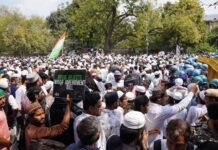Bangladesh’s government has banned marriage between Bangladesh nationals and Rohingya refugees from Myanmar, claiming that the latter are attempting to use marriage to gain citizenship.
“We have ordered marriage registrars not to officiate any union between Bangladeshi nationals and Rohingyas and also not to enlist marriage between Rohingyas themselves,” Anisul Haque, Minister of Law, Justice and Parliamentary Affairs told reporters in Dhaka. “We have already published a circular regarding the matter.”
The move comes after the issue was raised during this week’s annual meeting of deputy commissioners and top government officials in 64 districts of the country.
“We have received complaints that Rohingyas wed Bangladeshis and try to use the marriage certificate to gain Bangladeshi passports and other documents,” the minister added.
Haque warned that if any registrar violates the order they would face up to two years in jail.
In an interview with BBC Bangla Service, Haque defended the move when asked whether a government can dictate to whom one can marry.
“This doesn’t mean we are trying to control people’s freedom of marriage. Our intention is to comply with the official marriage registration system and we have clarified that marriage of illegal immigrants including Rohingyas doesn’t fall into that jurisdiction,” he said.
Subscribe to our newsletter and stay updated on the latest news and updates from around the Muslim world!
“Rohingyas have no legal status in Bangladesh as of now so they can’t be entitled to the legal option of marriage,” Haque added.
The decision was met with allegations of hypocrisy, given some eight million nationals live and work overseas. At least a quarter of them are illegal immigrants and many opt to marry foreign nationals in order to gain jobs and citizenship.
Imtiaz Ahmed, a professor of international relations at the University of Dhaka criticized the policy.
“Firstly, this is a violation of a universal human right and secondly, it will not do anything to solve the problem, but will complicate it further. This goes against the spirit of our 1971 war of independence that envisioned a truly democratic and humane Bangladesh”, he said.
The move would encourage corruption, given the likelihood of people bribing officials to marry, Ahmed added.
“Bangladesh should immediately nullify the ban in order to save face. The government must look to diplomatic efforts to convince the international community to press Myanmar to solve the Rohingya crisis and acknowledge their rights,” he said.
Up to 300,000 Rohingya are believed to be living in Bangladesh, having fled persecution in Myanmar. The majority are settled in the southeastern Cox’s Bazar district.
The UN’s refugee agency has granted official refugee status to some 30,000 Rohingyas, allowing them to reside in two official camps in Cox’s Bazar where they depend on government and NGO aid for survival. The remainder have been denied registration, with the government fearful it would encourage more to migrate to Bangladesh.
Bangladesh came under international condemnation in 2012 when it turned away thousands of Rohingyas fleeing sectarian violence in Rakhine state in Myanmar. The government also banned three international aid agencies from operating among unregistered Rohingyas in Cox’s Bazar, provoking another tide of international criticism.






















